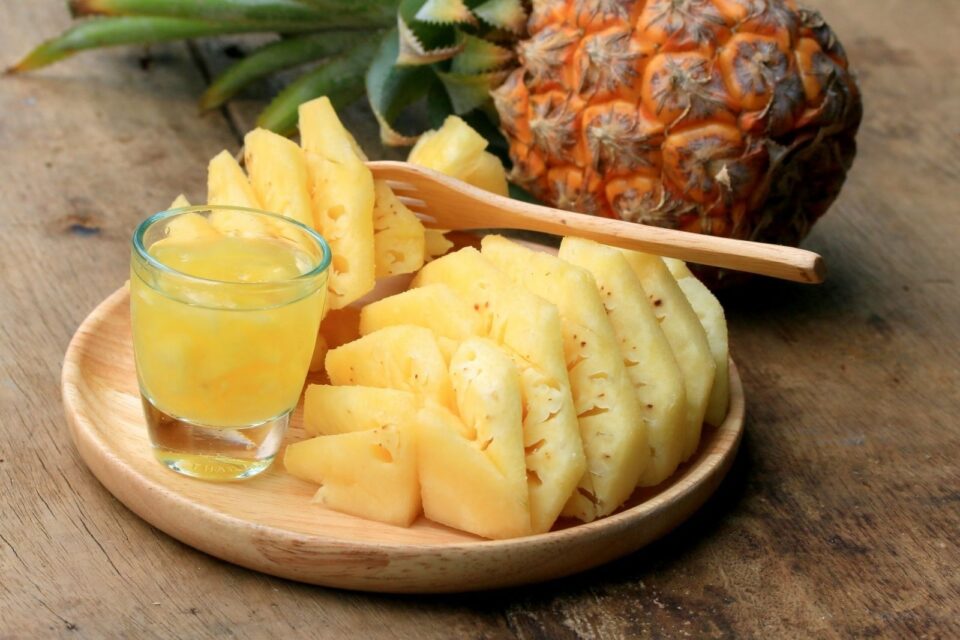Many of us, when eating pineapples, have a very special sensation that in addition to the sweet taste mixed with the sweet and sour taste, you also have a feeling of itching and burning.
This is why you can have a sore tongue when eating pineapples
Pineapple (also known as pineapple, pineapple) is a popular dessert and snack fruit. Try to take a bite of pineapple, don’t chew it and leave it on your tongue and you will gradually experience a burning sensation, discomfort in your mouth, or even bleeding in your lips, tongue or cheeks.
These symptoms occur immediately after eating and usually go away on their own without the need for medication or other treatment.
Causes tongue burn when eating pineapple
Many people still believe that this burning sensation is caused by the acid in pineapple. The real reason, however, is that pineapples contain bromelain, a mixture of digestive enzymes that has many benefits in anti-inflammatory treatment. The enzyme bromelain is concentrated in the core and the skin of the pineapple. This substance is beneficial for health, but upon contact with sensitive skin and around the mouth, it breaks down proteins causing a burning sensation.
If you eat too much pineapple, your mouth will hurt and your tongue will feel like you’ve rubbed it with sandpaper. Fortunately, the consequences are not that serious because the tissues in our mouth heal faster than the rest of the body.
Bromelain’s proteolytic ability is so strong that a few years ago some people said that fingerprints could be erased by rubbing the tip of a finger against a pineapple. Some people even believe that those who peel pineapple every day will gradually lose their fingerprints.
To explain this, rumors have circulated that bromelain digests the outermost layer of skin cells. However, scientists believe the above rumor to be unrealistic. When you rub the pineapple, your skin will be damaged and the fingerprints will be temporarily removed. After that, the damaged skin layer will be regenerated by the body and the fingerprints will return to normal.
Method to eat pineapple to avoid allergies
By eating directly (by eating raw)
After peeling the pineapple, cut it into small pieces and soak it in lightly salted water so that the enzyme that breaks down the protein is inhibited so that we don’t have a burning tongue. On the other hand, salt water helps shrink the lining of the mouth and tongue, making pineapple more fragrant and sweet. Pineapple soaking time of about 10 minutes is sufficient.
Cooked
Peel, remove the eyes and cut deeply, rinse the passable pineapple with a light saline solution. When frying and cooking under the influence of heat, the allergic capacity of pineapple will no longer exist. This method applies to young children, the elderly, those who are sensitive, or have food allergies … very good.
Points to note when consuming pineapple:
Choose to buy whole, fresh, healthy pineapple fruit, not crushed pineapple.
Note when you peel the pineapple to remove all the skin, cut deep for all the eyes.
It is recommended to rinse the pineapple with salt water before eating it.
For people with hemorrhagic diseases or at risk of bleeding such as nosebleeds, dengue fever, large wounds, women with bleeding …
Do not eat fresh pineapple when you are hungry because the organic acids in pineapple and bromelain have a strong impact on the stomach lining, intestines, causing hangovers, irritability …
Choose a pineapple that has a characteristic sweet smell and a yellow color. If the fruit is still green on the skin, turn it over leaving the tip on the counter for a few days until the pineapple turns yellow or orange.
Eating a lot of pineapple burns your tongue, so don’t eat too much at once to help prevent numbness in your mouth and reduce your risk of increased stomach acid.


